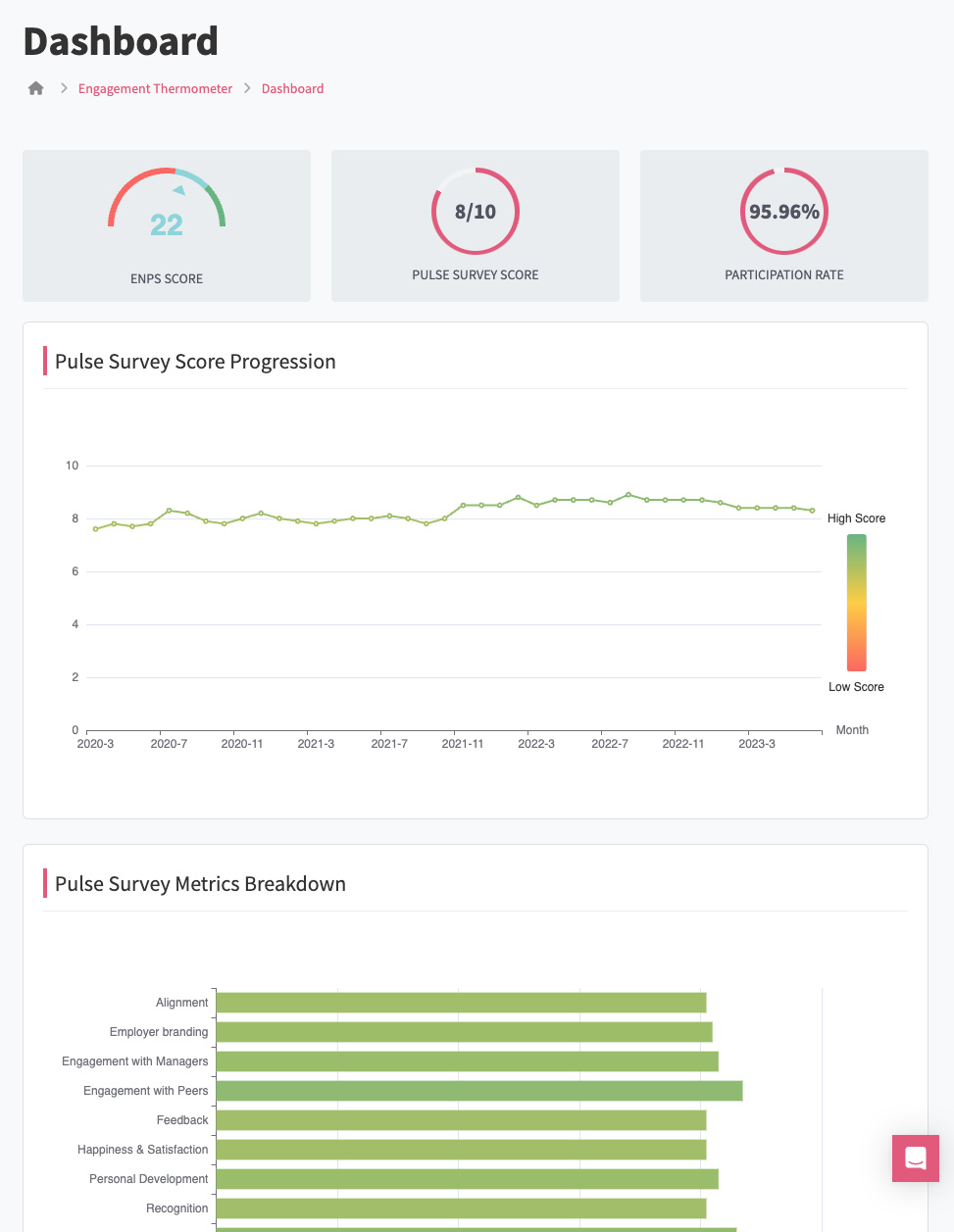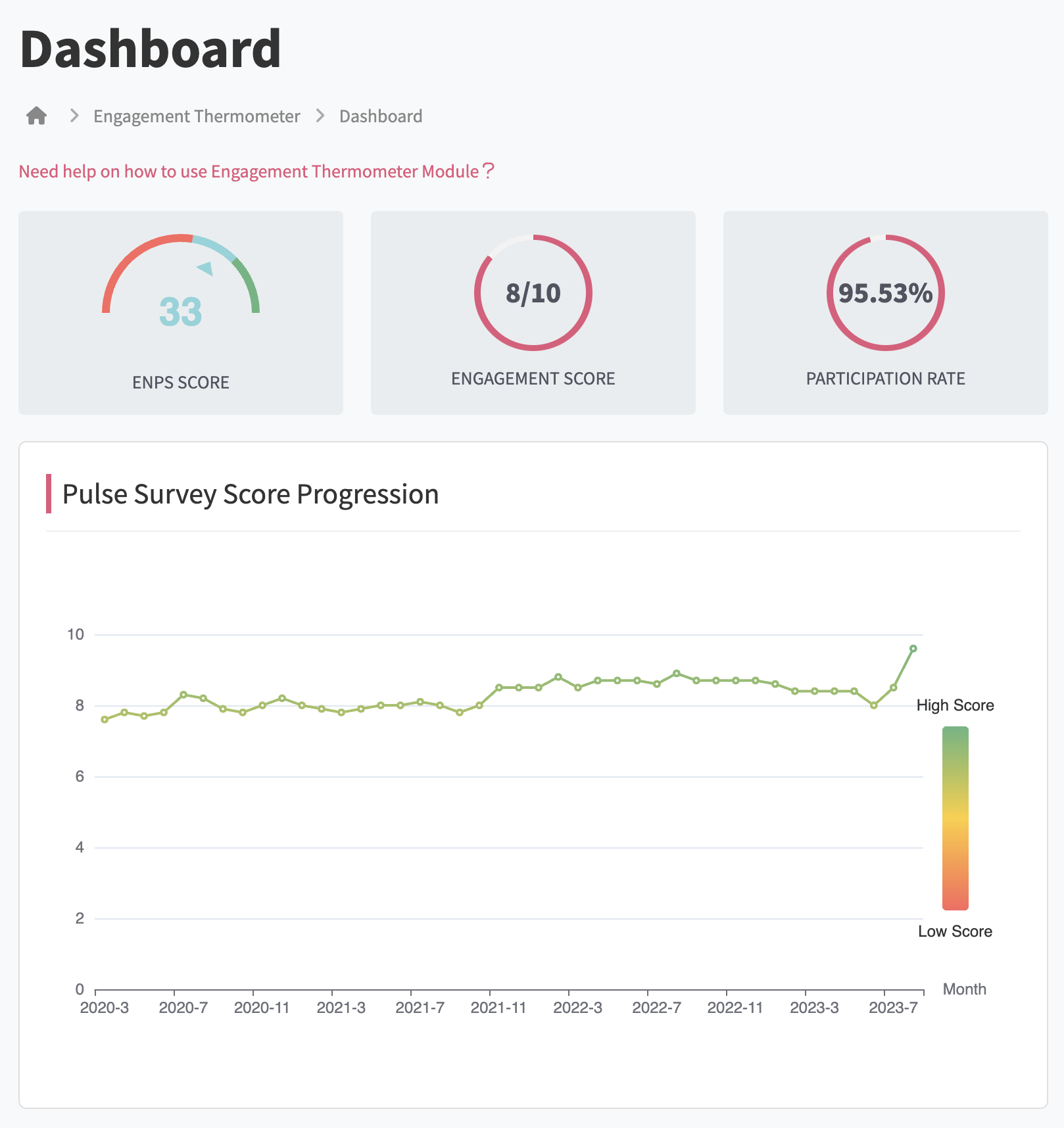 What is Organizational Climate?
What is Organizational Climate?
The Organizational Climate is the “thermometer” of the work environment. It reflects the employees’ perception of the company. How comfortable do they feel? How do they view communication, leadership, interpersonal relationships? All of this makes up the environment.
In summary, the Organizational Climate is like the company’s “collective sentiment”. This feeling can be positive, negative, neutral, and varies depending on several factors.
Difference between Environment and Organizational Culture
Although they seem similar, environment and organizational culture are not the same thing. The culture is like the identity of the company, its values, norms, beliefs. The environment, on the other hand, is people’s perception of this environment.
What are the benefits of a good organizational climate?
A good organizational climate is like a friendly and supportive environment at work. When employees feel happy and respected, they work better and are more creative. They also stay with the company for a longer time and cooperate well with others. This means the company can achieve its goals more easily and everyone enjoys their job more.
The main advantages of a good organizational climate are:
- Increased productivity: A positive and motivating work environment contributes to employees feeling committed and engaged in their tasks. This results in an increase in productivity, as teams work more efficiently and with greater dedication to achieve the company’s objectives.
- Reduction in absenteeism and turnover: When employees are satisfied with the work environment and have a good relationship with colleagues and leaders, they tend to be absent less and are less likely to leave the company. This helps reduce recruitment and training costs for new employees.
- Improved communication and cooperation: In a positive organizational climate, communication between teams and departments is facilitated. This promotes cooperation and teamwork, resulting in more creative and effective solutions to the challenges faced by the company.
- Increased employee satisfaction: Employees who work in a healthy and positive environment tend to feel more satisfied with their jobs. This has a positive impact on their motivation, self-esteem and sense of belonging to the organization.
- Improved company image: A positive organizational climate is an attractive factor for new talents. Companies with a reputation for providing a pleasant work environment are more likely to attract and retain the best professionals in the market.
- Increase in creativity and innovation: An environment where employees feel comfortable sharing ideas and are encouraged to be creative and innovative is conducive to the development of new solutions and the growth of the company.
- Reduced internal conflict: In an environment of healthy organizational culture, interpersonal conflicts tend to be reduced, as people are encouraged to solve problems in a constructive and respectful manner.
- Improved leaders’ performance: Leaders who value and promote a good organizational climate are more likely to gain the trust and respect of their teams. This helps to improve the overall performance of the company.
 How the Environment in the Company Can Influence Business Performance
How the Environment in the Company Can Influence Business Performance
It’s simple! When employees feel good, they perform better, and the business performance improves. Is there a better argument for investing in the Organizational Climate?
The environment of a company shapes its performance.
A clear and shared organizational culture increases employee commitment. Safe and comfortable physical environments improve productivity. Respectful and cooperative relationships at the workplace strengthen motivation and engagement. In addition, opportunities for career development and training keep employees loyal and productive.
All of this, in turn, contributes to a positive image of the company, attracting customers and talents. Therefore, it’s crucial to invest in a positive work environment to ensure long-term success.
7 Factors that Influence the Organizational Climate
These are some factors that influence the Organizational Climate:
- Organizational Culture: The culture directly impacts the environment. A healthy culture generates a positive environment. On the other hand, a toxic culture results in the opposite. Makes sense, doesn’t it?
- Leadership: Leaders have a great influence on the Organizational Climate. Their behaviors, decisions, and attitudes shape the work environment. Want a positive environment? Invest in effective leadership!
- Internal Communication: Clear and transparent communication is vital for a good environment. How can employees feel comfortable if they don’t know what’s going on?
- Professional Relationships: Healthy relationships between colleagues contribute to a good environment. If there are constant conflicts, the environment suffers. Therefore, it’s important to promote harmony in the team.
- Autonomy: Who doesn’t like to have some freedom to do their job? Autonomy can help create a positive Organizational Climate.
- Trust and Transparency: Trust is fundamental for a good environment. When there’s transparency and honesty, trust grows and the environment improves.
- Recognition: Recognition is a powerful motivator. It shows employees that their work is valued, creating a positive environment.
 How to measure and manage the Organizational Climate?
How to measure and manage the Organizational Climate?
To improve your company’s environment and climate, you need to identify and measure it first.
An effective way to measure the environment is through an Organizational Climate study.
Climate Studies
The climate studies represent an important tool for human resources management with respect to the analysis of the organizational climate. These studies should be done recurrently throughout the year, so that it allows decision-makers to feel the pulse of the organization and be able to act in case of drastic changes.
With GFoundry, through a set of 130 questions divided by 9 different metrics, it’s possible to implement an Organizational Climate Study in just a few minutes.
By setting the frequency of the study (which can be weekly, bi-weekly, or monthly), the questions are posed to the collaborators, on a scale of 0 to 10 (with colored icons), allowing access to the Engagement Score divided by 9 metrics. The 9 metrics are:
- Personal Development;
- Engagement with Managers;
- Engagement with Peers;
- Happiness & Satisfaction;
- Employer Branding;
- Feedback;
- Balance between Personal and Professional Life;
- Alignment;
- Recognition.
In addition to allowing a general perspective of the organization as a whole in terms of organizational climate, it is also possible to analyze this by segments, be it by functional teams, or by certain groups of employees. The responses are anonymous, so it is not possible to obtain individual responses from employees.
Know more about our Climate Studies solution here.
 Examples of Organizational Climate Survey Questions Based on Organizational Climate KPIs
Examples of Organizational Climate Survey Questions Based on Organizational Climate KPIs
The questions of an Organizational Climate survey vary depending on the KPIs you wish to evaluate. Below are some examples of questions that align with the different Organizational Climate KPIs:
These are just examples, the GFoundry platform allows you to create customized surveys with the questions that best align with your company’s goals.
 How to Conduct an Organizational Climate Survey?
How to Conduct an Organizational Climate Survey?
Just create a questionnaire, distribute it to the employees, collect the responses and analyze them. It seems simple, but it is a process that can be very complex and especially time-consuming and impossible to manage in the long term.
However, conducting an Organizational Climate Survey has never been easier thanks to the Engagement Thermometer tool from the GFoundry platform. Instead of following the conventional process of creating a questionnaire, distributing it, collecting responses and analyzing them manually, our tool automates and enhances each step of this process.GFoundry allows you to set up Pulse Surveys, which enable you to continuously assess your organization’s climate over time. These surveys can be set up to be conducted weekly, biweekly, or monthly, with varied and comprehensive questions distributed over 9 key performance metrics.
Furthermore, the platform provides a detailed dashboard where you can view your survey results, broken down by category and topic, with the ability to apply various filters for specific analyses. You can also measure your eNPS (Employee Net Promoter Score) to assess the loyalty and satisfaction of your employees.
Finally, you can create customized assessments for any purpose, using scale or open-ended questions, or a combination of both, and set the periods in which these will be applied.
All of this makes GFoundry a powerful tool for effectively and efficiently conducting Organizational Climate surveys, allowing you to monitor the organizational climate and make informed improvements to increase the engagement and satisfaction of your employees.
10 Action Tips to Improve the Organizational Climate
There are several strategies you can use. Here are some tips.
- Promote Employee Integration: Organize activities that promote interaction between employees. This helps to strengthen interpersonal relationships and improves the environment.
- Celebrate Achievements: Celebrate victories, big or small. This shows appreciation and improves team morale.
- Share Knowledge: Promote learning and development sessions. This not only increases team skills but also improves the environment.
- Provide Experiential Rewards: Rewards don’t have to be just monetary. You can offer days off, gift vouchers, among others. The important thing is to show appreciation.
- Recognize Efforts: Recognizing the effort and good work of employees is one of the most effective ways to improve the Organizational Climate. This recognition can take several forms, from a simple compliment to promotions or bonuses.
- Promote Open and Transparent Communication: Lack of clear communication can lead to misunderstandings and unnecessary conflicts. Encourage open and honest communication among all team members.
- Provide Regular Feedback: Employees want to know how they are performing. Providing regular feedback helps them understand what they are doing well and where they can improve. In addition, it shows that you care about their development.
- Improve the Physical Space: A clean, organized, and comfortable workspace can have a big impact on the Organizational Climate. Think about things like proper lighting, comfortable furniture, a nice break area, etc.
- Invest in Effective Leadership: Leadership plays a crucial role in the work environment. Investing in leadership training and development can have a significant impact on the Organizational Climate.
- Prioritize Employee Well-being: Showing that the company cares about the well-being of its employees can significantly improve the Organizational Climate. This can include things like promoting a healthy work-life balance, offering mental health benefits, etc.
To Remember!
The Organizational Climate is a crucial component of a company’s success. It affects employee satisfaction, productivity, and ultimately, the company’s results. Therefore, investing time and resources to improve the Organizational Climate is a smart investment for any company. We hope this guide helps you better understand this important concept and implement effective strategies to improve your company’s environment. Read the article: The Potential of Pulse Surveys: Transforming Surveys into Leadership Tools
 Quick answers to frequently asked questions about organizational climate
Quick answers to frequently asked questions about organizational climate
1. What are the benefits of a good organizational climate?
A good organizational climate fosters a positive work environment, enhancing employee morale, collaboration, and overall satisfaction, ultimately leading to improved productivity and reduced turnover.
2. How does an effective organizational climate help employees?
An effective organizational climate provides employees with clear expectations, support, and resources, enabling them to excel in their roles and find purpose in their work.
3. What is organizational climate and why is it important?
Organizational climate refers to the perceived work environment and the collective mood of employees. It’s important as it directly impacts employee morale, performance, and retention.
4. What is the importance of organizational climate in business productivity?
A positive organizational climate encourages higher levels of engagement, collaboration, and innovation, directly boosting business productivity and the bottom line.
5. What are the benefits of a good office environment?
A good office environment promotes health, well-being, and concentration among employees, resulting in better teamwork, creativity, and reduced absenteeism.
6. What are the benefits of having a strong organizational culture?
A strong organizational culture instills shared values, enhances cohesion among employees, and guides behavior, leading to a more aligned, committed, and efficient workforce.
7. How does organizational climate affect performance?
Organizational climate shapes employees’ perceptions, attitudes, and behaviors. A positive climate can enhance motivation and effort, leading to higher performance, while a negative one can demotivate and hinder productivity.
8. What are the six motives for organizational climate?
The six motives are: need for achievement, affiliation, autonomy, dominance, clarity, and recognition. These motives influence how employees perceive and respond to their work environment.
9. How does organizational climate affect motivation of employees?
Organizational climate influences employees’ sense of value, belonging, and purpose. A supportive climate enhances motivation, as employees feel recognized, challenged, and aligned with organizational goals.
10. What are the 4 types of organizational climate?
The four types are: participative, supportive, controlling, and competitive. Each type affects employee behavior, motivation, and satisfaction differently.
11. How do you create a positive organizational climate?
Creating a positive organizational climate involves clear communication, fostering mutual respect, recognizing achievements, providing opportunities for growth, and addressing concerns promptly.
12. What are the major qualities of organizational climate?
Major qualities include openness, trust, mutual respect, clear communication, employee empowerment, and a shared sense of purpose.
13. How does organizational climate affect organizational culture?
Organizational climate reflects the current mood and perceptions of employees, while culture embodies the company’s values and beliefs. A consistent positive climate can reinforce a strong culture, whereas inconsistencies might challenge or erode cultural foundations.
14. What are the factors affecting organizational climate and retention?
Factors include leadership style, communication, job design, rewards and recognition, training opportunities, and work-life balance. These elements influence employees’ decisions to stay with or leave an organization.
15. How does climate change affect productivity?
Climate change can impact productivity through extreme weather events, disruptions in supply chains, and changes in resource availability, forcing businesses to adapt or face potential losses.
16. How does organizational climate affect employee commitment?
A positive organizational climate fosters a sense of belonging and alignment with the company’s values. This strengthens employee commitment, as they feel valued and see their contributions as meaningful.
Subscribe to GFoundry Newsletter: Weekly Insights on HR’s Most Pressing Topics
Keep on reading:
- The Ultimate Guide for Remote Onboarding
- The Metrics and Emotions: Analyzing Pulse Surveys’ Dual Power
- Building Resilient and Adaptive Workforces: A Global Talent Trends Study
- Real-world OKR examples across different industries
- Talent management platform to boost employee engagement
- How to Choose the Right Talent Management Platform for Your Business
- How to Attract, Retain, and Develop Top Talent
- The Ultimate Guide to Remote Talent Management
- The Impact of the Employee Value Proposition on Talent Attraction
- HR Trends: What Will HR Look Like in 2024?
- How to improve Employee Engagement and Performance? Your Ultimate Guide
- Employee well-being – the complete guide
- How to create Impactful Learning Journeys for Employees?
- Feedback: what it is, its importance and how to do it (complete guide)
- OKRs – Objectives and Key Results: what they are, what their purpose is and how they can be useful when applied in an agile way
- What is the importance of Compensation and Benefits for employees?
Ready to get started?
Take the next step and learn more about how GFoundry can help you.

 What is Organizational Climate?
What is Organizational Climate? How the Environment in the Company Can Influence Business Performance
How the Environment in the Company Can Influence Business Performance How to measure and manage the Organizational Climate?
How to measure and manage the Organizational Climate? Examples of Organizational Climate Survey Questions Based on Organizational Climate KPIs
Examples of Organizational Climate Survey Questions Based on Organizational Climate KPIs How to Conduct an Organizational Climate Survey?
How to Conduct an Organizational Climate Survey?
 Quick answers to frequently asked questions about organizational climate
Quick answers to frequently asked questions about organizational climate